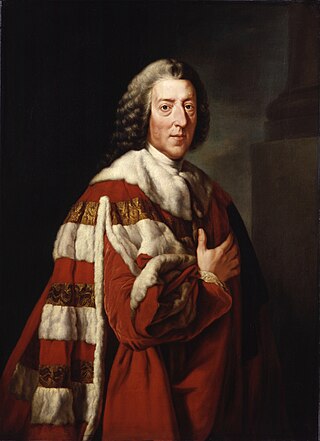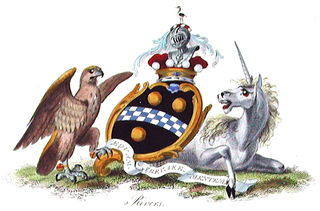Coat of arms

The Pitt family were an English aristocratic family whose members included the Earls of Chatham, the Earls of Londonderry and the Barons Camelford. [1] The family produced two British Prime Ministers: William Pitt, 1st Earl of Chatham, and his son William Pitt the Younger.
The family's fortunes were boosted greatly by Thomas Pitt who while serving as Governor of Madras acquired the Regent Diamond and sold it on at a great profit in 1717.


William Pitt, 1st Earl of Chatham, was a British Whig statesman who served as Prime Minister of Great Britain from 1766 to 1768. Historians call him "Chatham" or "Pitt the Elder" to distinguish him from his son William Pitt the Younger, who also served as prime minister. Because of his long-standing refusal to accept a title until 1766, Pitt also was known as "the Great Commoner".

Sir William Beckford was a Jamaican-born planter and Whig politician who twice served as Lord Mayor of London in 1762 and 1769. One of the best known political figures in Georgian era London, his vast wealth derived from the sugar plantations and hundreds of slaves he owned in the British colony of Jamaica. In Britain, Beckford was a supporter of the Whig party, including Prime Minister William Pitt, 1st Earl of Chatham. He also publicly supported progressive causes and frequently championed the London public.
John Thomas Townshend, 2nd Viscount Sydney of St Leonards was a British peer and Member of Parliament.

Baron Rivers was a title that was created four times in British history, twice in the Peerage of England, once in the Peerage of Great Britain and once in the Peerage of the United Kingdom.

Thomas Pitt, 1st Baron Camelford was a British politician who sat in the House of Commons from 1761 until 1784 when he was raised to the peerage as Baron Camelford. He was an art connoisseur.
Thomas Steele PC was a British politician at the turn of the nineteenth century.
Cecil Weld-Forester, 1st Baron Forester was a Tory British Member of Parliament and later peer.
Robert Pitt was a British politician who sat in the House of Commons from 1705 to 1727. He was the father and grandfather of two prime ministers, William Pitt the elder and William Pitt the younger.
Bennet Sherard, 1st Earl of Harborough was a British peer and Member of Parliament.

Baptist Noel, 3rd Viscount Campden was an English politician. He was Lord Lieutenant of Rutland, Custos Rotulorum of Rutland and the Member of Parliament for Rutland.
George Lane-Fox, of Bramham Park, Yorkshire, was a British landowner and Tory politician.
Sir William FitzWilliam, of Windsor, Berkshire, was an Irish courtier and Member of Parliament in England. He was Chief Gentleman of the Privy Chamber to Edward VI of England; Deputy Chancellor of Ireland; Lieutenant of Windsor Castle; Keeper of Windsor Great Park and Lord Lieutenant of Berkshire.
Richard Myddelton, of Chirk Castle, Denbighshire, was a Welsh politician.

George Simon Harcourt, 2nd Earl Harcourt, styled Viscount Nuneham until inheriting the title of Earl Harcourt in 1777, was an English politician, patron of the arts, and gardener.
William Nedham was an Irish and British politician who sat in the House of Commons between 1774 and 1790.
Henry Pelham (1759–1797) was a British Army officer and politician, Member of Parliament for Lewes from 1780 to 1796.
Robert Nedham was a British-Jamaican plantation owner and politician who sat in the House of Commons for the rotten borough of Old Sarum from 1734 to 1741.
Lt-Col. Cecil Forester was a British soldier and Member of Parliament.
Major Francis Forester was a Tory British Member of Parliament.
Lady Harriet Villiers was an Anglo-Irish noblewoman who was the mother and grandmother of two British prime ministers, William Pitt the elder and William Pitt the younger.